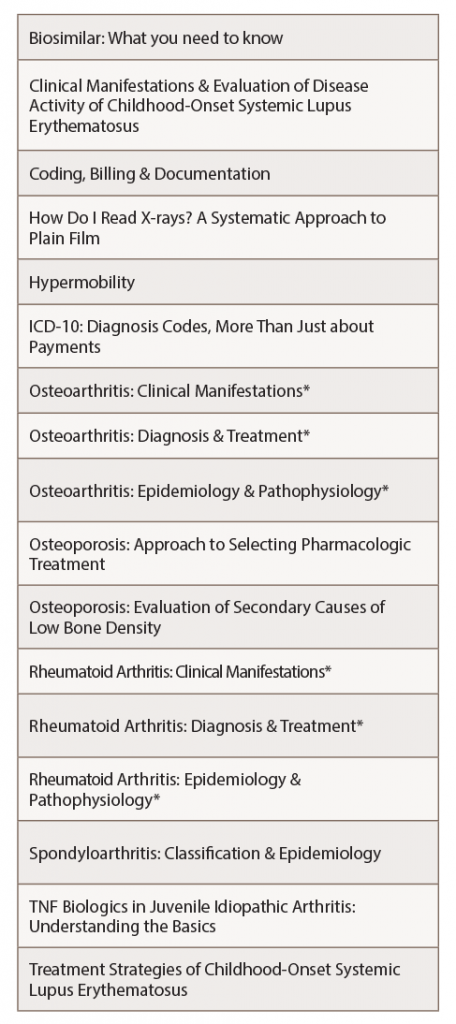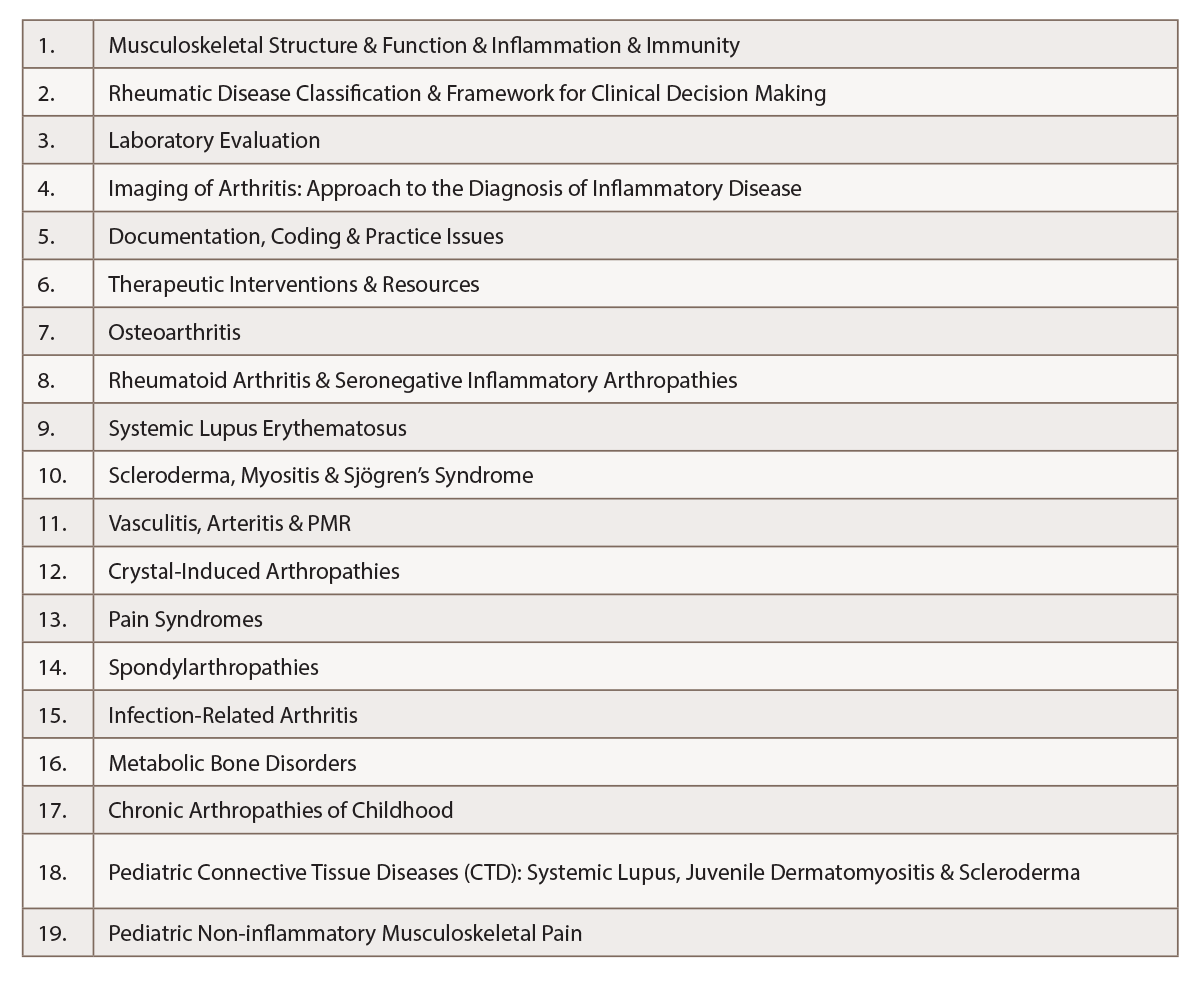The Advanced Rheumatology Course (ARC) carries the distinction of being the first online educational product of the ACR/ARP. In the early 2000s, members of the College thoughtfully considered action needed to efficiently prepare health professionals looking to enter the rheumatology workforce. A decision was made to create online educational products with the specific target audience of those new to rheumatology, most of all physician assistants (PAs) and nurse practitioners (NPs). This landmark decision has influenced the careers of hundreds of rheumatology health professionals and the lives of thousands of people with rheumatic disease.
A study published in 2007 suggested a large gap in the supply of rheumatologists.1 This supply-and-demand gap was further demonstrated in a 2018 follow-up study that documented a larger than anticipated workforce shortage.2 This shortage has a significant impact on both adult and pediatric rheumatology care. Reasons for this workforce gap include: 1) the rising prevalence of rheumatic diseases as the age of the general population increases, 2) mass retirement of current rheumatologists, and 3) a desire among new graduates and women to work only part time.2 It is anticipated that by the year 2030, the U.S. will be short 4,133 full-time-equivalent rheumatologists.2
Experts have suggested strategies for broadening the reach of rheumatology care should include:
- Increasing the number of training opportunities for rheumatology fellows;
- Improving musculoskeletal expertise of primary care physicians; and
- Integrating more NPs and PAs into rheumatology practice.
Even though non-physician rheumatology practitioners are a key asset to close the rheumatology workforce gap, NPs and PAs do not receive much exposure or formal didactics in rheumatology during their initial training.3 To facilitate this integration, they need a reliable, comprehensive, easily accessible and trustworthy learning resource. Keeping these goals in mind, the ARC debuted in December 2008. Although originally developed with NPs and PAs in mind, many other professionals, including fellows in training, residents and primary care physicians, have found success with this course.
The ARC consists of 19 activities that comprehensively cover rheumatology topics. Six activities, labeled core content, address basic immunology, cover rheumatology-specific laboratory testing and provide a review of radiographic principles in rheumatic disease. The remaining activities are organized around a disease-based schema, with 10 concentrated on adult rheumatology and three focused on pediatric conditions (see Table 1). Each activity is peer reviewed and authored by rheumatology health professionals who are respected experts on the topic.
In December 2018, the entire ARC course was relaunched to reflect scientific advances in care and adapt to online learners’ needs. Following the update, users will find new features designed to enhance interactivity and user experience including mini quizzes to benefit retention, author-delivered audio content to emphasize key learning points and other interactive features. Learners may choose single or bundled activities offered along the core, pediatric and adult tracks. The ARC is eligible for a total of 48.5 continuing medical education (CME) hours.

(click for larger image) Table 2: Rheumatology eByte topics
* Act soon if you want to take the eByte courses marked with an *. Those will be discontinued Jan. 17, 2020.
Previous attendees have found the ARC valuable in their professional development. The following is a sampling of the feedback received:
- “I am new to the rheumatology field. I learned how to diagnose and treat patients, as well as disease pathology, from this course.” —Kathryn, nurse practitioner
- “The ARC helped me become more familiar with the criteria for various diagnoses. And more familiar with lab work, imaging and what is needed to complete a full comprehensive assessment.” —Richard, occupational therapist
- “I saw an improvement in overall patient care from physical exam to monitoring treatment.” —Kaitlyn, nurse practitioner
- “It has enhanced my knowledge overall. My patient education has particularly become more extensive.” —Caitlyn, physician assistant
Although the ARC is comprehensive, the College recognized the need to have educational activities that can be completed in a short period of time. Rheumatology eBytes are online activities created to provide small bites of pertinent rheumatology-related information that can be completed in under 30 minutes. Initially, Rheumatology eBytes addressed the topics of osteoarthritis and rheumatoid arthritis, but have since expanded to include information on radiographic studies, biologics, biosimilars and tumor necrosis factors in juvenile idiopathic arthritis and other areas. Rheumatology eBytes are free to all College members and offer a total of 8.5 hours of CME (see Table 2).
The Rheumatology Research Foundation offers an award to assist rheumatology professionals in their endeavor to complete the ARC. The aim of the Health Professional Online Education Grant is to increase the knowledge and skills of rheumatology health professionals to meet the needs of a growing rheumatology patient population by reimbursing the cost of ARC registration. There are four application due dates for those interested: Feb. 1, May 1, Aug. 1 and Nov. 1.
The ARC is a comprehensive, online educational tool that continues to have an important role in facilitating the knowledge obtainment of rheumatology professionals. Rheumatology eBytes complements the ARC. The College continues to support rheumatology professionals to expertly meet the needs of persons with rheumatic disease.
References
- Deal CL, Hooker R, Harrington T, et al. The United States rheumatology workforce: Supply and demand, 2005–2025. Arthritis Rheum. 2007 Mar;56(3):722–729.
- Battafarano DF, Ditmyer M, Bolster MB, et al. 2015 American College of Rheumatology workforce study: Supply and demand projections of adult rheumatology workforce, 2015–2030. Arthritis Care Res (Hoboken). 2018 Apr;70(4):617–626.
- Harvey WF, Hassett AL, Lakhanpal S. Editorial: Ensuring the future of rheumatology: A multi-dimensional challenge and call to action. Arthritis Rheum. 2018 Jun;70(6):797–800.


